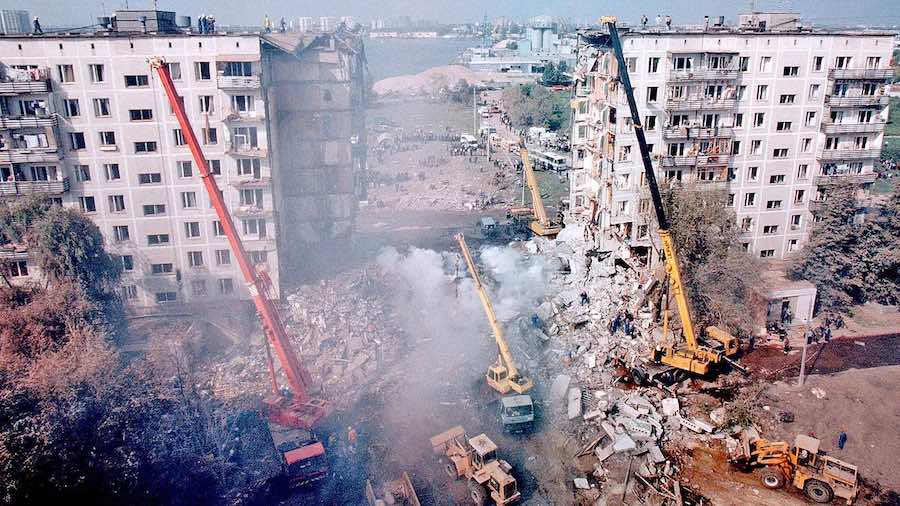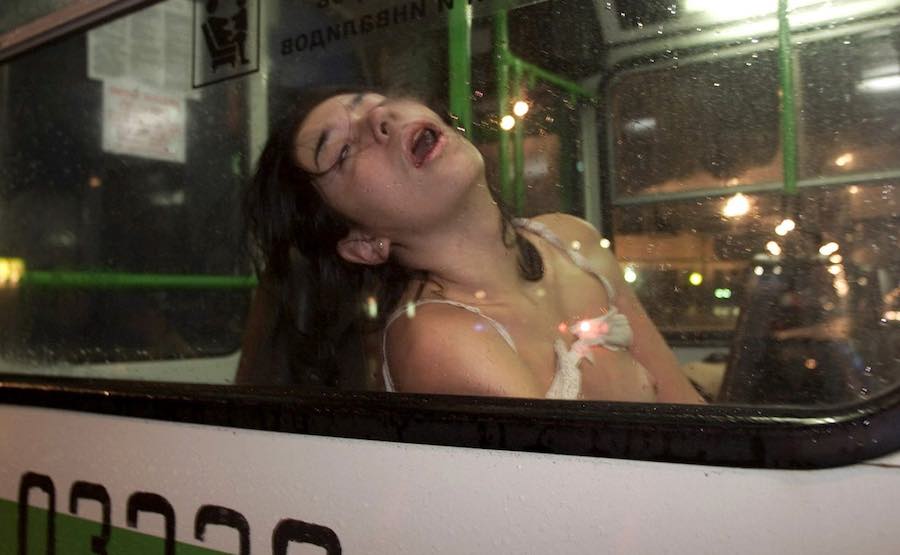The FINANCIAL — Three children have died as a result of a terrorist attack at Crocus City Hall outside Moscow on Friday night, according to hospital data posted on the Moscow Region’s Health Ministry website.
At least five children were among those hospitalized after the massacre, officials have said.
The venue was booked for a rock concert when the atrocity took place, with heavily armed gunmen breaking into the building and indiscriminately shooting visitors. They then reportedly set fire to the building.
The death toll stands at more than 60, although that number may rise, the Russian Investigative Committee told the media early on Saturday.
Russian Health Minister Mikhail Murashko has said that of the roughly 115 people that have been hospitalized, at least five are children. Their ages range from seven to 12, and two 12-year-olds are currently in serious condition. An 11-year-old girl is in moderately serious condition with a gunshot wound, while her mother was among those killed, local authorities reported. Her father and older sister survived unscathed.
Earlier, children’s ombudswoman Maria Lvova-Belova told the Russia-24 TV channel that a boy with a gunshot wound was among the children being treated.
The Crocus City complex, located in Krasnogorsk, just northwest of Moscow, includes sports and leisure facilities besides the concert venue where the attack took place. A number of other children were there that evening, visiting from nearby towns and taking part in competitions. All were evacuated unharmed, local media reported.
Several witnesses say there were multiple families with their children among the Friday night crowd in the building when the shooting began.
“People carried their children in their arms. No one knew where it was safe at the time, there was this incomprehensible feeling of what could meet us in the hall, or on the street,” lawmaker Ayder Metshin, who was there for the concert, told RT.
He added that he and other concertgoers had stayed low to the ground and exited at the back of the hall along with the musicians, before making their way out of the venue.
ISIS has claimed responsibility for an attack at a popular concert hall complex near Moscow Friday after assailants stormed the venue with guns and incendiary devices, killing at least 60 people and injuring 145.
The terror group took responsibility for the attack in a short statement published by ISIS-affiliated news agency Amaq on Telegram on Friday. It did not provide evidence to support the claim.
Video footage from the Crocus City Hall shows the vast complex, which is home to both the music hall and a shopping center, on fire with smoke billowing into the air. State-run RIA Novosti reported the armed individuals “opened fire with automatic weapons” and “threw a grenade or an incendiary bomb, which started a fire.” They then “allegedly fled in a white Renault car,” the news agency said.
Former FSB agent Alexander Litvinenko, who defected and blamed the FSB for the bombings, was poisoned and killed in London in 2006. A British inquiry later determined that Litvinenko’s murder was “probably” carried out with the approval of Putin and Patrushev.
Earlier this month, the US embassy in Russia said it was “monitoring reports that extremists have imminent plans to target large gatherings in Moscow,” including concerts. The embassy warned US citizens to avoid large gatherings. On Friday, following reports of the Crocus City Hall attack, it advised US citizens not to travel to Russia.
Starting in November, there has been a steady stream of intelligence that ISIS-K was determined to attack in Russia, according to two sources familiar with the information.
ISIS-K stands for ISIS-Khorasan, the terror organization’s affiliate that is active in Afghanistan and the surrounding region.
US National Security Council spokesperson Adrienne Watson said the US government had had information about a planned terrorist attack in Moscow – potentially targeting large gatherings, to include concerts – and that this is what prompted the State Department to issue the public advisory.
“The US government also shared this information with Russian authorities in accordance with its longstanding ‘duty to warn’ policy,” Watson said.
In a speech Tuesday, Putin had blasted the American warnings as “provocative,” saying “these actions resemble outright blackmail and the intention to intimidate and destabilize our society.”
Ukrainian military intelligence spokesman Andriy Yusov suggested the attack was a “deliberate act of provocation by Putin’s special services”.
Russian apartment bombings
In September 1999, a series of explosions hit four apartment blocks in the Russian cities of Buynaksk, Moscow, and Volgodonsk, killing more than 300, injuring more than 1,000, and spreading a wave of fear across the country. The bombings, together with the Invasion of Dagestan, triggered the Second Chechen War. The handling of the crisis by Vladimir Putin, who was prime minister at the time, boosted his popularity greatly and helped him attain the presidency within a few months.
The blasts hit Buynaksk on 4 September and Moscow on 9 and 13 September. On 13 September, Russian Duma speaker Gennadiy Seleznyov made an announcement in the Duma about receiving a report that another bombing had just happened in the city of Volgodonsk. A bombing did happen in Volgodonsk—but only three days later—on 16 September. Chechen militants were blamed for the bombings, but denied responsibility, along with Chechen president Aslan Maskhadov.
A suspicious device resembling those used in the bombings was found and defused in an apartment block in the Russian city of Ryazan on 22 September.
On 23 September, Vladimir Putin praised the vigilance of the inhabitants of Ryazan and ordered the air bombing of Grozny, which marked the beginning of the Second Chechen War. Three FSB agents who had planted the devices at Ryazan were arrested by the local police.
The next day, FSB director Nikolay Patrushev announced that the incident in Ryazan had been an anti-terror drill and the device found there contained only sugar, and freed the FSB agents involved.
On the same day, Russian Dictator Putin said all four people directly involved in committing the attack were arrested on their way to Ukraine, where “a window” was prepared for their escape.
The official Russian investigation of the Buynaksk bombing was completed in 2001, while the investigation of the Moscow and Volgodonsk bombings were completed in 2002. In 2000, seven people were convicted of perpetrating the Buynaksk attack. According to the court ruling on the Moscow and Volgodonsk bombings, which was announced in 2004, the attacks were organized and led by Achemez Gochiyaev, who remains at large. All bombings, the court ruled, were ordered by Islamist warlords Ibn Al-Khattab and Abu Omar al-Saif, who have been killed. Five other suspects have been killed and six have been convicted by Russian courts on terrorism-related charges.
Attempts at an independent investigation have faced obstruction. State Duma deputy Yuri Shchekochikhin filed two motions for a parliamentary investigation of the events, but the motions were rejected by the State Duma in March 2000. An independent public commission to investigate the bombings was chaired by Duma deputy Sergei Kovalev.
The commission was rendered ineffective because of government’s refusal to respond to its inquiries. Two key members of the Kovalev Commission, Sergei Yushenkov and Yuri Shchekochikhin, have since died in apparent assassinations. The Commission’s lawyer and investigator Mikhail Trepashkin was arrested and served four years in prison for revealing state secrets.
Former FSB agent Alexander Litvinenko, who defected and blamed the FSB for the bombings, was poisoned and killed in London in 2006. A British inquiry later determined that Litvinenko’s murder was “probably” carried out with the approval of Putin and Patrushev.
The attacks were widely attributed to Chechen terrorists, although their guilt has never been conclusively proven. Some Western historians and journalists claim the bombings were coordinated by Russian state security services to help bring Putin into the presidency.
Others disagree with such theories or argue that there is insufficient evidence to assign responsibility for the attacks.

The 2002 Nord-Ost siege
On 23 October 2002, 40 Chechen militants headed by warlord Movsar Barayev took 912 hostages at the Dubrovka Theatre in Moscow, where the popular musical Nord-Ost was showing.
Three days later Russian security services pumped sleeping gas into the hall, stormed it and killed all the attackers.
But some 130 hostages died – most not at the hands of the gunmen and women, but apparently because of the effects of the gas.
The Moscow chief public health doctor Andrey Seltsovskiy and President Vladimir Putin himself insisted that the gas could not have caused death, but its name and chemical formula remain secret.
Many have assumed it was a compound based on fentanyl – an opioid that can be hundreds of times more potent than morphine. It can cause a fatal heroin-like overdose – but the symptoms can be reversed with the drug naloxone.

No investigation
The execution of the hostage-taking operation itself raised questions in many Russians’ minds.
Forty Chechen rebels arrived in Moscow with more than 100kg of explosives, about 100 hand grenades, three heavy bombs, 18 Kalashnikov assault rifles and 20 pistols.
Mr Putin, by a decree which was never officially published, awarded FSB deputy director Vladimir Pronichev, who managed the operation, the title of Hero of Russia.
Efforts by MP Sergey Yushenkov to carry out parliamentary hearings were blocked by the pro-Kremlin majority.
According to the results of a 2010 opinion poll, 74% of Russians did not fully trust the official version of events.
A group of victims and their relatives sued the Russian government, demanding an open investigation into the case and declassification of the relevant information. In January 2003 the Tverskoy court in Moscow rejected the claims.
In December 2011, the European Court of Human Rights in Strasbourg ruled in favour of 64 victims and ordered the Russian government to pay them about a million euros in compensation.
The court found that the Russian authorities did not prepare the rescue operation in a proper way.
Putin is preparing for war with NATO
Since the start of the war in Ukraine, the approval rate of the Russian Government has risen by 25% and the Disapproval rate decreased by 40%.
Putin’s Approval rating is up by 5% according to the Levada Research Center based in Moscow.
Putin’s rating also jumped during the 2008 war with Georgia and the 2014 annexation of Crimea from Ukraine.
Russian television and a sophisticated social media operation project Putin as a robust patriot and deride Western leaders such as Biden as weak, foolish and deceitful.
It is expected that Putin will try to justify a series of “special operations” against his political enemies inside and outside of Russia after the Moscow terror.
He will also use the crisis for possible military conflict with NATO countries. On March 23, FSB linked the terrorist attack to Ukraine. “The perpetrators of the terrorist attack – which has left at least 115 people dead – had contacts on Ukrainian soil”, FSB said.
Russia is preparing for a large-scale conventional conflict with NATO, according to the Institute for the Study of War, based on an analysis of several Russian financial, economic, and military indicators.
Russia is ramping up preparations for a potential military conflict and planning to double the number of its troops stationed along its border with the Baltic states and Finland, Estonia’s intelligence chief claimed.
A week ago President Putin warned the West that a direct conflict between Russia and the U.S.-led NATO military alliance would mean the planet was one step away from World War Three but said hardly anyone wanted such a scenario.
French President Emmanuel Macron last month said he could not rule out the deployment of ground troops in Ukraine in the future, with many Western countries distancing themselves from that while others, especially in eastern Europe, expressed support.
Asked by Reuters about the Macron remarks and the risks and possibility of a conflict between Russia and NATO, Putin quipped: “everything is possible in the modern world.”
Based on reports by rt, cnn, bbc, ap




























Discussion about this post